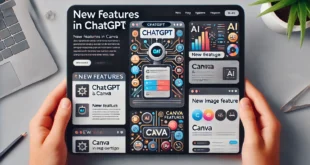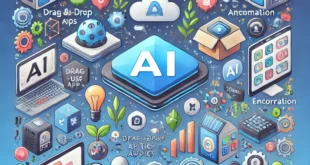Apps for mobile devices have also been profoundly affected by the advent of artificial intelligence (AI). Mobile apps that use AI are becoming smarter, more efficient, and more personalized, which in turn is changing the way we engage with technology. Whether it is voice assistants, increased security, or predictive algorithms, artificial intelligence (AI) in mobile applications is here to stay.
Here we will take a look at some of the most well-known apps that use AI, talk about what makes them special, and shed light on current research in the field.
The Role of AI in Improving Mobile Apps
Artificial intelligence (AI) is finding numerous uses in mobile apps, all with the goal of enhancing their functionality, user experience, and productivity. Artificial intelligence is having a profound effect in the following critical areas:
- Individualization
By studying the user’s activities, preferences, and interactions, AI systems may provide a unique and tailored experience. Apps may learn from users’ behaviors, preferences, and content preferences with the use of machine learning models. - Voice Assistants and NLP
Mobile apps are becoming better at understanding and responding to user requests with the help of voice recognition and natural language processing technologies. While Alexa, Siri, and Google Assistant are well-known examples, many more apps are also using AI to improve their voice-based interactions. - Recognition by Image and Face
Apps can now recognize faces, objects, and QR codes thanks to AI-powered image recognition. Security, photo editing, and e-commerce apps all make use of AI to improve features like product scanning, image tagging, and user identity verification. - Analytics for Predictions
By studying prior behaviors and usage patterns, AI enables apps to forecast user behavior and trends. Targeted advertising, personalized content delivery, and improved customer service experiences are all possible with predictive analytics. - Chatbots and Help Desks
Customer service and support applications are seeing a rise in the usage of chatbots powered by AI. By providing 24/7 service, answering frequently asked questions, and resolving issues, these bots help increase customer happiness while decreasing operating expenses.
Hands-On AI-Enabled Mobile Apps
A few top examples of mobile apps that make good use of AI are these:
1. Google Assistant
Google’s artificial intelligence-driven voice assistant. It allows users to control their smart home, get personalized recommendations based on their actions and tastes, and works with a number of applications to provide features like reminders, hands-free navigation, and more.
To comprehend spoken requests and deliver tailored suggestions, Google Assistant uses deep learning models and natural language processing. Users are able to accomplish more with its assistance, including making calls, creating reminders, and controlling IoT devices.
2. Prisma
Prisma is an AI-powered photo editing app that applies neural network-based artistic filters to your images. It offers personalized picture effects and integrates with several social networking sites for easy sharing.
Inspired by the works of great artists like Van Gogh and Picasso, Prisma combines artificial intelligence and neural networks to turn ordinary images into pieces of art. In order to evaluate photos and add creative effects instantly, the software employs deep learning algorithms.
3. Replika
Replika is a conversational AI bot designed to be a companion. It uses natural language processing and machine learning to offer personalized interactions, and its character traits adapt according to individual user preferences.
Replika learns from user interactions to deliver a more tailored experience. The goal is to promote better mental health through the provision of conversational companionship and emotional support.
4. Face++
Face++ is a facial recognition platform that uses AI to detect and analyze faces in images. It offers features like emotion analysis, pose detection, gender and age identification, and can be integrated into security, social media, and retail apps.
One platform that employs AI to detect and analyze faces in photos is Face++. Apps for security, social media, and even retail use it extensively to provide unique experiences for customers.
5. Grammarly
Grammarly is an AI-powered writing assistant that helps users with spelling and grammar correction, style recommendations, plagiarism checks, and vocabulary customization.
The writing suggestions provided by Grammarly are generated in real-time through the use of machine learning and natural language processing. It checks for typos, grammatical errors, and stylistic mistakes, helping users improve their work.
Artificial Intelligence Studies for Mobile Apps
The area of artificial intelligence (AI) in mobile apps is constantly developing, with state-of-the-art studies being carried out to enhance the intelligence, speed, and efficiency of apps. Here are a few of the most fascinating fields of study:
- AI that Protects Users’ Privacy through Federated Learning
To maintain sensitive user data on the user’s device, federated learning enables AI models to be trained across many devices while data is kept decentralized. By preventing the uploading of user data to central servers, this method allays privacy concerns. - Advanced Machine Learning and Brain-Based Systems
Mobile app AI solutions often rely on deep learning and neural networks. In order to develop algorithms that are more effective, precise, and energy-efficient while still functioning flawlessly on mobile devices, researchers are consistently enhancing these models. - Artificial Intelligence in Edge Computing
By bringing AI processing closer to the consumer, edge computing minimizes latency and reduces reliance on cloud-based processing. For AR and real-time face recognition, among other real-time applications, this is of the utmost importance. - Natural Language Understanding (NLU) in Human-Computer Interaction
Natural language understanding (NLU) research is advancing chatbots and voice assistants to grasp increasingly nuanced user inputs. Conversations will be more natural and context-aware when AI is able to understand not only words but also their meaning, which is something that researchers are striving to improve.
Academic Works and Research Publications
If you are interested in the technical aspects of artificial intelligence (AI) for mobile apps, there are a plethora of research papers and scholarly magazines that explain the methods, algorithms, and developments that are making this area unique. Some pertinent research papers are included below:
- Survey on Artificial Intelligence and Mobile Applications
Incorporating artificial intelligence into mobile applications is a hot topic right now, and this article covers all the bases. - From Algorithms to Applications: A Survey of Mobile AI
The article delves into the effects of AI algorithms on smartphones and the constraints of present-day technology. New developments, such as federated learning, are also covered. - Augmented Reality: An AI Solution for Mobile Apps on Demand
The goal of this study is to advance edge AI so that AI models can execute locally on mobile devices rather than on the cloud.
Conclusion
Thanks to AI, mobile apps are becoming more user-friendly, productive, and tailored to each user’s needs. The application of artificial intelligence (AI) in mobile apps has endless possibilities, from improving the user experience through intelligent voice assistants to transforming industries through predictive analytics. New and interesting developments in artificial intelligence (AI) technologies like federated learning, deep learning, and edge computing are sure to emerge from the current wave of research. The next generation of mobile apps will be able to not just adapt to our changing demands, but also predict them as we use AI more and more.
 AI Generated Apps AI Code Learning Technology
AI Generated Apps AI Code Learning Technology



